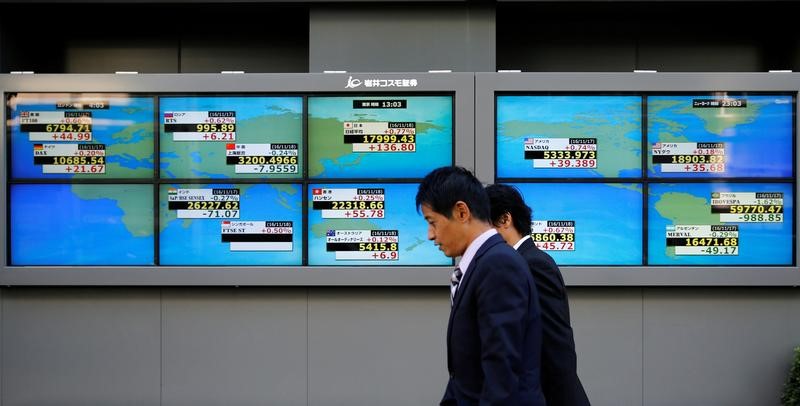By Jamie McGeever
LONDON (Reuters) - World stocks fell on Monday, after two huge European merger and acquisition deals fell through and billionaire U.S. investor Warren Buffett warned that while stocks are cheap, they are currently unpredictable and prone to a sudden, steep correction.
The dollar was steady and U.S. Treasury yields struggled to bounce much from the biggest weekly fall since July, while French bond yields hit a one-month low as polls showed centrist Emmanuel Macron would easily beat far-right candidate Marine Le Pen if the two face up in May's presidential election runoff.
Europe's benchmark index of leading 300 shares (FTEU3) fell 0.2 percent to 1,456 points, led lower by insurers and exchange operators. Assicurazioni Generali (MI:GASI) fell 3.7 percent after bank Intesa Sanpaolo (MI:ISP) said late on Friday it had decided not to pursue a possible tie-up with Italy's biggest insurer.
Meanwhile, the proposed 29 billion euro merger between the London Stock Exchange (L:LSE) and Deutsche Boerse (DE:DB1Gn) to create Europe's biggest stock exchange looked dead in the water due an inability to meet European antitrust demands. Shares in both companies fell by as much as 3 percent on Monday.
"The regulatory hurdles were always a risk, and with Brexit, there are additional hurdles to clear that seem close to insurmountable now," said Neil Wilson, senior market analyst at ETX Capital.
Euro zone stocks performed better, with the index of leading 50 shares (STOXX50E) up 0.2 percent, lifted by a 0.8 percent rise in euro zone bank stocks (SX7E). Intesa Sanpaolo rose as much as 5 percent after the bank pulled its bid for Generali.
MSCI's benchmark world stock index slipped 0.2 percent (MIWD00000PUS), on course for its first consecutive daily fall for three weeks. On Thursday, it hit a record high of 447.67 points.
MSCI's broadest index of Asia-Pacific shares outside Japan (MIAPJ0000PUS) fell 0.3 percent, near the day's lows, while Japan's Nikkei closed (N225) 0.9 percent lower at a 2-1/2 week low on concerns that a stronger yen would crimp corporate earnings.
U.S. futures pointed to a flat open on Wall Street (ESc1)
It was still the Dow's 11th consecutive record high on Friday, the longest such run since 1987, leading some to suggest it could be prone for a correction. Warren Buffett, chairman and chief executive of Berkshire Hathaway Inc (N:BRKa), told CNBC on Monday that Wall Street is unpredictable and "could go down 20 percent tomorrow".
FRENCH POLLS
In bond markets, the focus was on France, where the latest polls showed that centrist Emmanuel Macron would score a more convincing victory over far-right and anti-euro Marine Le Pen in the presidential election's runoff vote.
France's 10-year bond yield fell 2.5 basis points to a one-month low of 0.88 percent
Benchmark Spanish, Italian and Portuguese yields all fell between 3 and 5 basis points.
Meanwhile, U.S. bond yields remained under pressure as investors turn their attention to U.S. President Donald Trump's State of the Union address on Tuesday, in which he is expected to unveil some elements of his plans to cut taxes in his joint address to Congress.
The 10-year U.S. Treasury yield edged up 1 basis point to 2.32 percent (US10YT=RR) from Friday's five-week low of 2.31 percent. Last week's fall of nearly 11 basis points was the steepest weekly decline since July last year.
In currencies, the dollar was flat on an index basis (DXY). The euro was up 0.2 percent at $1.0580
Sterling buckled on media reports that Scottish nationalists were preparing to demand a fresh independence vote, possibly announcing as early as March to coincide with UK Prime Minister Theresa May's plan to formally trigger Britain's exit from the European Union.
In addition to Trump's address to Congress, U.S. rates and the dollar will take their cue this week from Federal Reserve Chair Janet Yellen's speech on Friday.
"In order for the Fed to really have the option of hiking next month, Yellen will have to make a much stronger case relative to what's been said recently," said Deutsche Bank (DE:DBKGn) market strategist Jim Reid.

In commodities, Brent crude (LCOc1) rose 0.9 percent to $56.48 per barrel while U.S. West Texas Intermediate (CLc1) was up 0.8 percent at $54.42 per barrel as a global supply glut appeared to ease. [O/R]